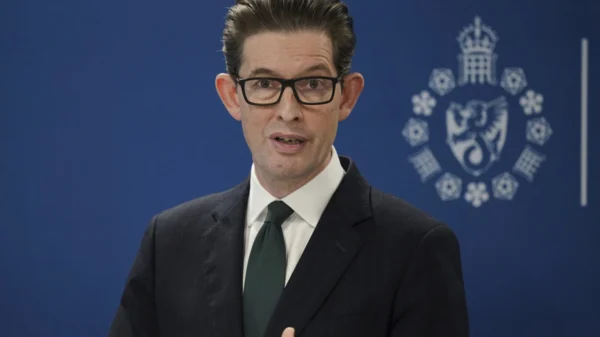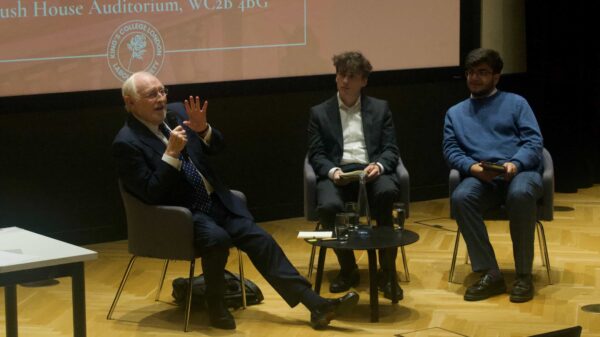On February 8, 2022, the KCL Conservative Association and the KCL Labour Society had their first debate since the Covid-19 pandemic started. The two societies debated whether or not Britain should privatise the National Health Service (NHS).
The debate, run by Charles Amos, departed from the pre-Covid format. Rather than being between members of the two societies this debate was between two experts, Dr Kristian Niemietz from the Institute of Economic Affairs and Chris Thomas from the Institute for Public Policy Research. This was followed by a Q&A session in which said experts faced questions from students in both societies.
Dr Kristian Niemietz: In favour of the Privatisation of the NHS
Dr Kristian Niemietz opened with the claim that a privatised NHS would most likely resemble the Netherlands’ healthcare system. Here, each citizen has private health insurance and a private system is responsible for the provision of healthcare, yet the state plays an “extensive role” in making it “universally accessible”. To do so, they give subsidies to those who cannot pay and ensure that people cannot be overcharged or denied healthcare for any conditions they may have.
Niemietz then argued that the country should introduce privatisation as it would produce better medical outcomes for Britain. Justifying this claim, Niemietz referred to studies showing that “the Dutch system is well ahead of the NHS” in several areas, including survival.
To dissuade fears of Britain replicating America’s healthcare system, Niemietz stated that “there’s nothing particularly unusual or unique about” the Dutch system, unlike America’s system which isn’t even “vaguely comparable” to that of any other country. Therefore, he said that a privatised NHS would resemble the Netherlands’ more typical system.
Arguing against the idea that the NHS’ current problems are caused by underfunding, he stated that the Netherlands’ spending on healthcare is “almost identical” to Britain’s. He also argued against the idea that political mismanagement caused the NHS’ failures by stating that “a system that is so dependent on who is in government” is flawed as it relies on people voting the correct people into power, unlike marketised sectors which “do not depend that much on who is in government”.
Chris Thomas: Against the Privatisation of the NHS
Chris Thomas agreed with Niemietz that the NHS is struggling, that its outcomes are insufficient, and that we should focus on what to do about this rather than romanticising our current system. However, he disagreed with the idea that privatisation would solve these issues, saying that the switch from its original Bevenite principles to a focus on marketisation and competition was at the root of the NHS’ problems.
Thomas then traced the cause of this switch to the actions of leaders from both parties. His narrative of events went as follows. After the Roy Jenkins review stated that the NHS is a system waiting to find out who’s in charge, an era of what Thomas calls “business school policies” took over how it was run. A provider commission created budget holders facilitating competition between different trusts and Thatcherite legislation focused on turning patients into consumers for choice. Competition-based policies continued under Blair’s public management system, banning collaboration between providers. This led to “one of the best-funded national health services that we’ve ever had” seeing “trusts that were struggling with deficits”. Under Cameron, the NHS “was challenged to find £20 billion of efficiency savings over just a couple of years” in response to this, forcing it to cut through essential services.
After recounting these events, Thomas pointed to international data showing that the NHS had been artificially starved of the resources that it needed by the time that the pandemic began. This, and other issues concerning the NHS are, in the eyes of Thomas, “fundamentally down to the instruments of competition”. According to him, the model is not the problem, but it is instead the artificial constraints that the NHS has been put under. He argued that more marketisation is not the solution and that a switch to privatisation would be hugely expensive and disruptive. Instead, he suggested that we return to “the founding principles that made the NHS so brilliant in the first place”.
Dr Kristian Niemietz: Rebuttal against Thomas
Niemietz argued that “too much marketisation” does not explain why the NHS is behind systems that are “vastly more marketised”, saying that the NHS is “one of the least marketised systems in the world, so you can’t tell me that the reason why it does badly is that it’s too marketised”.
In regards to the increased marketisation of the NHS, Niemietz stated that this was a good thing that improved outcomes in some ways. He then claimed that the marketisation of healthcare improves its outcomes, as it does in other sectors, saying that healthcare “does not exist outside of the normal rules of economics”.
Lastly, Niemietz pointed out that in a lot of markets, companies compete in some ways and cooperate in others, demonstrating that both methods can exist simultaneously.
Chris Thomas: Rebuttal against Niemietz
Thomas opened his rebuttal by saying that, “just because you can imagine a market-based system” that works, that doesn’t mean “that it’s the right thing for UK politics”. He stated that markets are not inherently good, pointing out that “there are many markets that don’t work well in the UK today” and that they “can be politically skewed as much as a public system can”.
More importantly, Thomas argued that a shift to a market-based system would be “fundamentally undemocratic”. He explained that “in polling of political parties” there is “almost universal support” from both parties for the continuation of our current healthcare model and that “health is the most important issue for voters today”. Considering this, he argued that it wouldn’t be right to shift to a marketised system and said that it is unlikely to be a possibility as “any political party that tries to move forward to privatisation” would be “doomed to lose all political support”.
To conclude, he noted the “failure of the experiment with competition over the last forty years” and the direction that the government has taken in response to it and used this to back up his argument.
Q&A and Conclusion
During a 50-minute Q&A, the experts were asked about the possibility of transitioning from one system to another, whether or not funding is more important than the healthcare system used, and the hold that the NHS has on voters among other concerns.
After a quick hands-up vote at the end of the debate, the majority of students voted in favour of privatisation. A handful of audience members booed this outcome.
Former Culture Editor for Roar News.



















